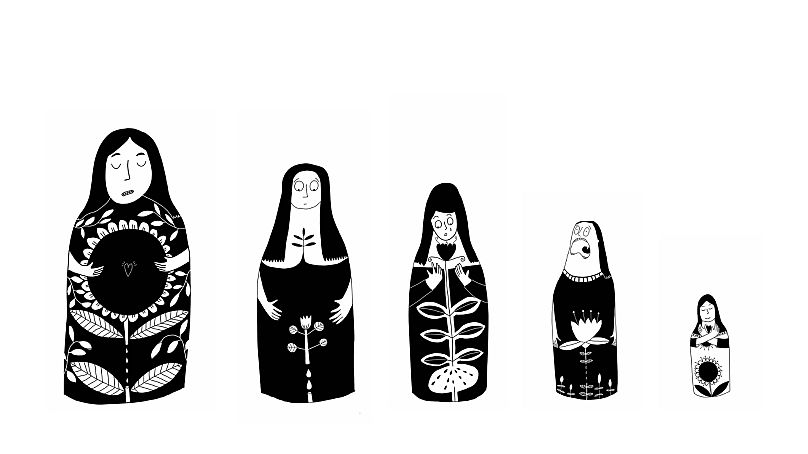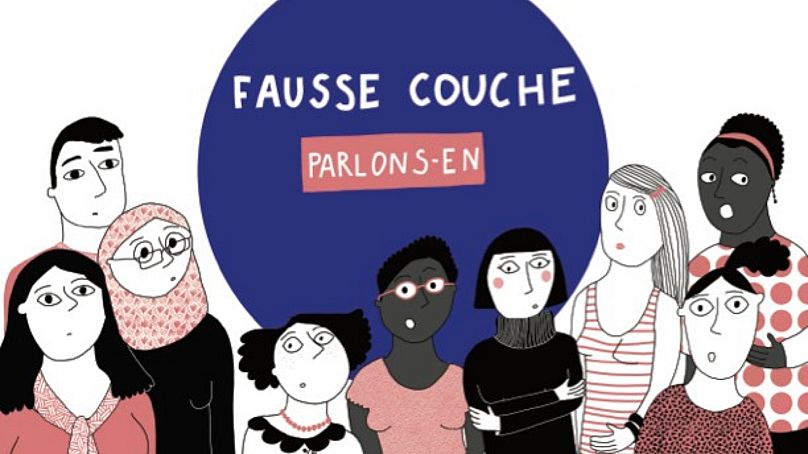Miscarriage is a common struggle for many women but the emotions and turmoil it can create are too often overlooked or ignored. This French illustrator uses her drawings to shed light on the issue.
At least one in ten women around the world will miscarry in her lifetime, which means nearly everyone on the planet likely knows someone who has had a miscarriage.
Why, then, are we so bad at talking about them?
French illustrator Mathilde Lemiesle has made it her mission to break the taboo through her comic strips, which she’s turned into a book called “_My Almost Nothings_”.
On her Instagram of the same name, she gathers testimonies from women, thoughts and studies and transforms them into emotional and educational drawings addressing miscarriage, feminism and women’s rights.
“What surprised me most at the start of My Almost Nothings is realising that I wasn’t alone,” Lemiesle told Euronews Culture. “That was a real revelation for me, especially because we had all experienced the same things, the same pains. That was very important for what the account became and for my own activism.”
At the heart of Lemiesle’s fight is her own personal story. She experienced four miscarriages before giving birth to her daughter, and said she felt isolated and ill-informed about what was happening inside her body.
Drawing is what helped her get her feelings out onto paper, and ultimately heal. Now she hopes to offer other women the same respite, giving them a space to share their experiences while also informing them of the more nitty gritty aspects of miscarriage.
“The fact that women are ill-informed puts them in situations that can be dangerous,” she says. “For example, we’re often told that it’s like a heavy period, when that’s not at all the case. It’s yet another way to minimise what they’re going through and it’s just unacceptable.”
Some of the common cultural norms that Lemiesle takes issue with:
The fact that women are told to keep their pregnancies private until their foetus is 12 weeks old, after which the probability of a miscarriage is lower. That doctors tell them a miscarriage “feels like a heavy period.” That friends and family, who struggle to find the words, often brush a miscarriage off as nothing to worry about.
Even the term miscarriage is problematic, according to Lemiesle. In French, a miscarriage translates to “fausse couche” or “false birth”. Lemiesle says this puts the blame squarely on women for failing to carry the pregnancy to term. She advocates instead for the more neutral term “grossesse arrêtée” or “stopped pregnancy” to be used.
“The term false birth isn’t correct if you ask me, because there’s nothing false about it,” she said. “It devalues what the woman is experiencing, it trivialises it and minimises it.”
A similar debate in the English-speaking world suggests “pregnancy loss” should be used instead of “miscarriage,” which implies the woman has made a “mistake”.
Speaking freely about pregnancy loss is the first step towards normalising it in society, and Lemiesle says she’s noticed more and more people are coming forward with their own stories of miscarriage.
“It’s increasingly talked about, by celebrities who tell their own personal stories, but also I think in tighter, more intimate circles of women,” she said. “All of this is bringing the issue into the public and political spheres, because it affects a lot of women.”
In France, 200,000 miscarriages occur every year - representing around one in four pregnancies. In March, the National Assembly unanimously approved a new draft law to give women more support in the event of a miscarriage.
The bill, which goes before the Senate this week and is expected to pass into law, offers women paid leave from work in the event of a miscarriage. It also gives them access to mental health services covered by social security.
“I think it’s a very good step towards something,” Lemiesle said. “It makes the issue known and shows that it’s an issue, that it’s not nothing. (Pregnancy loss) exists and it has both an emotional and physical impact. But we need to go even further.”













